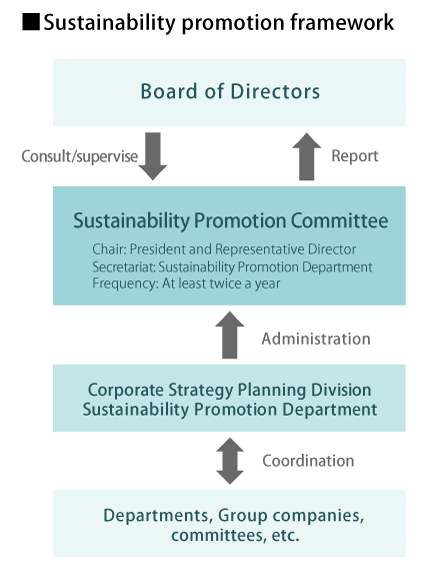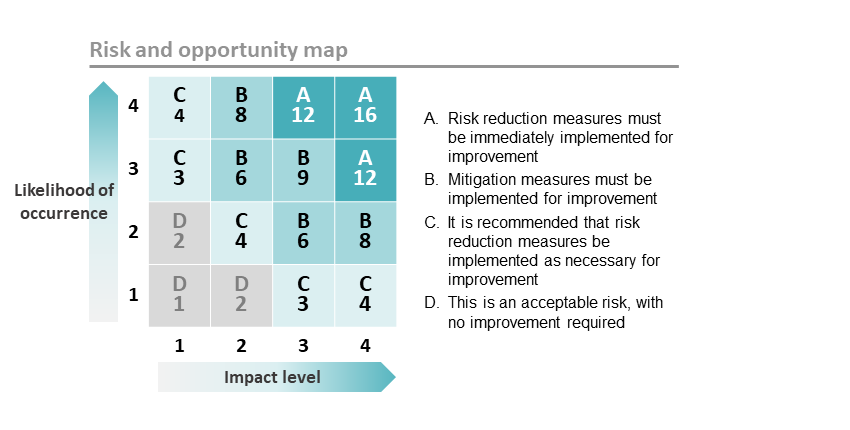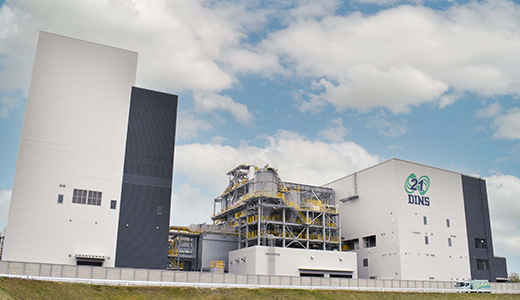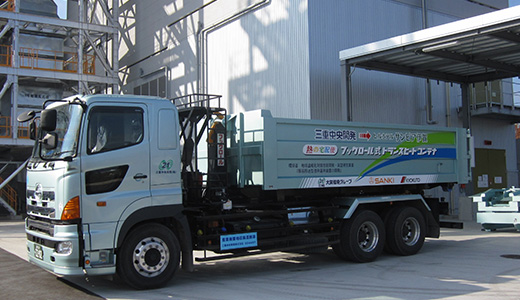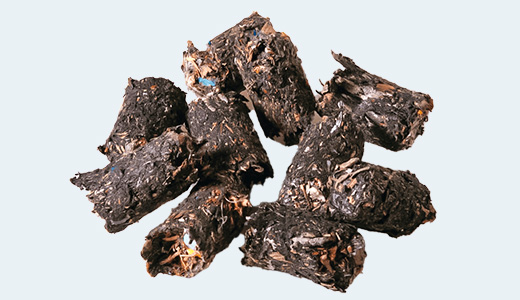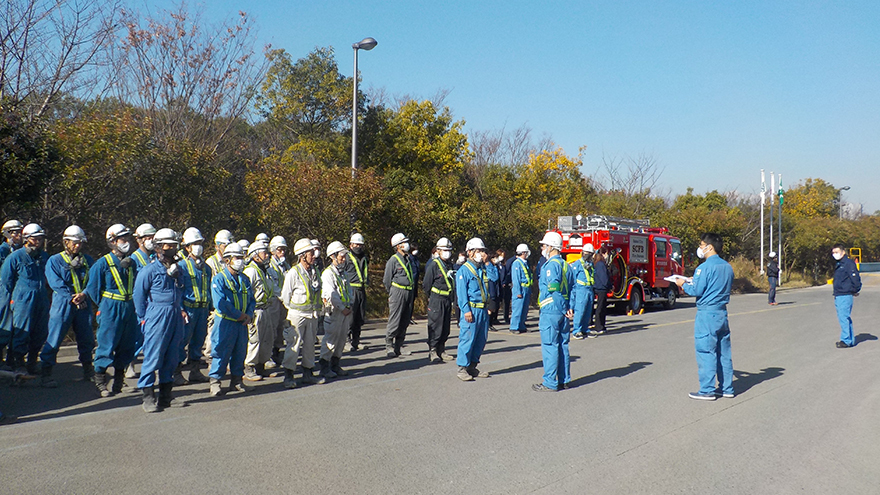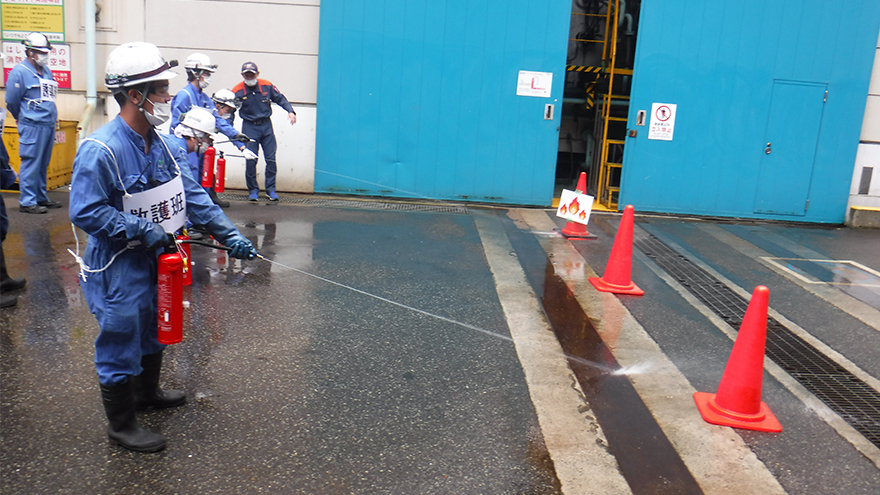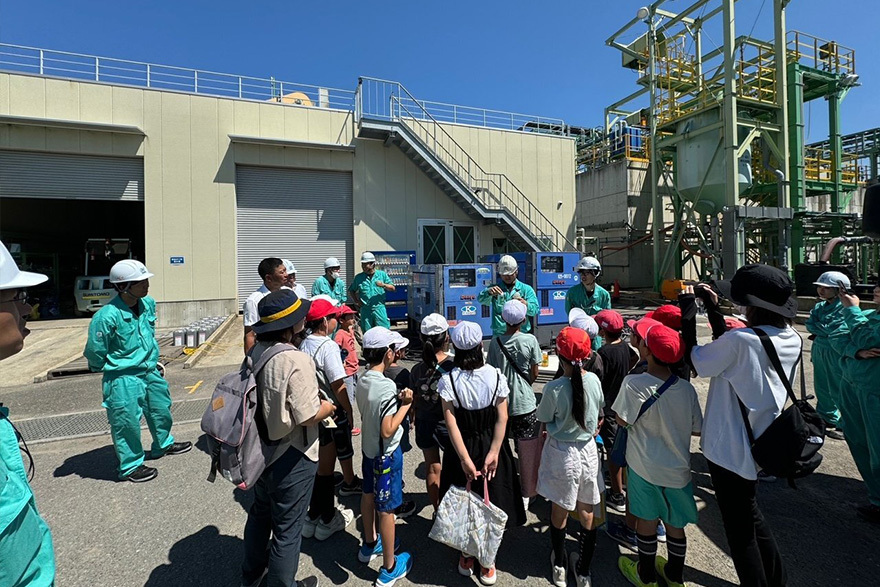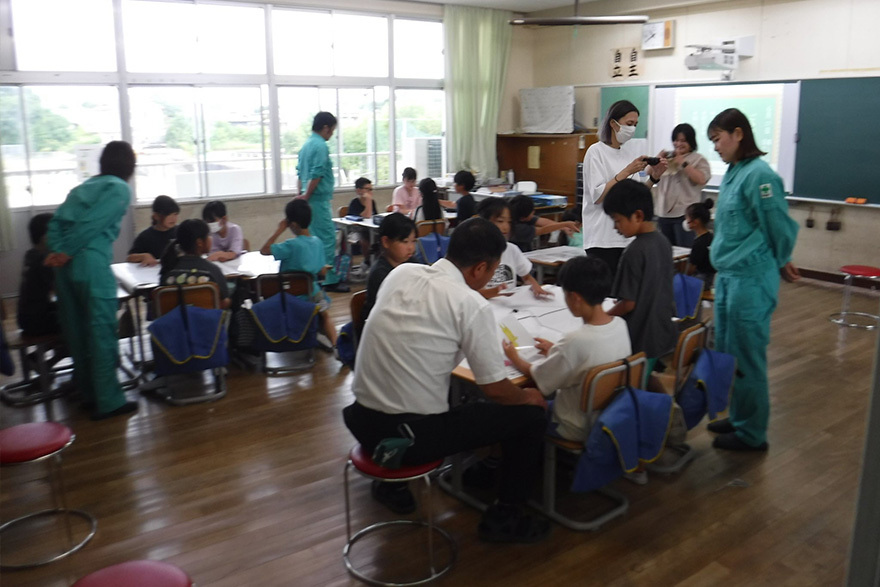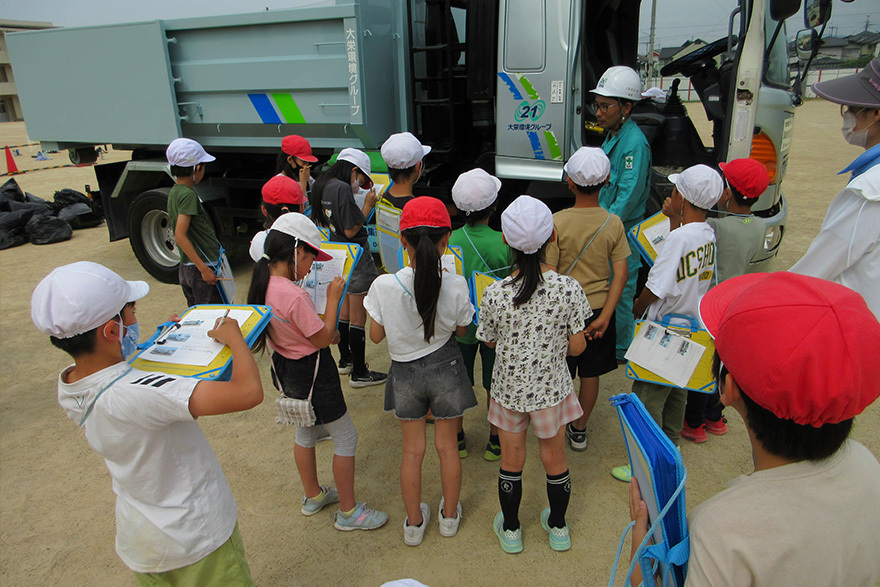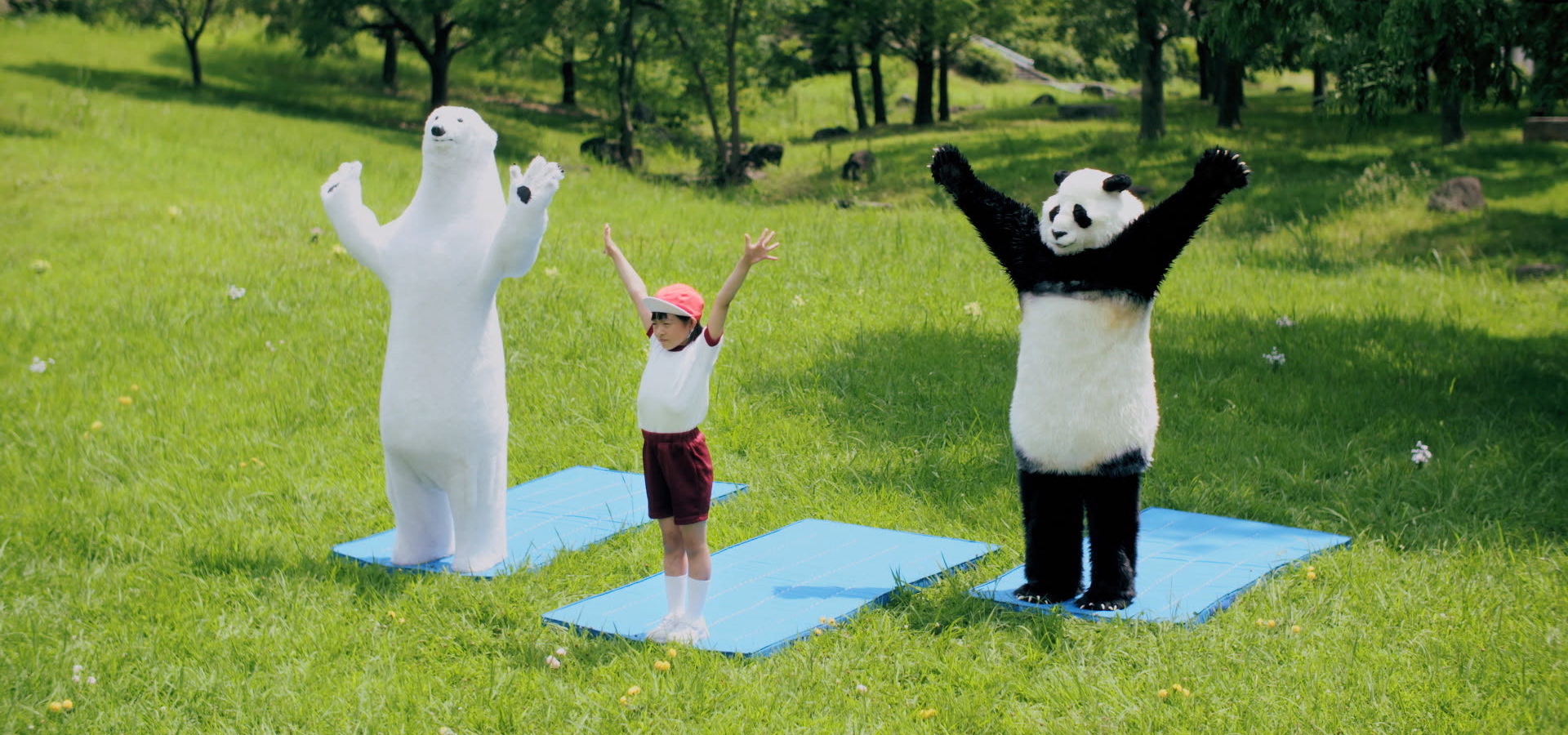Environment
Basic Approach
We continue to make proactive investments in our efforts to build more sophisticated resource recycling systems.
At the same time, we are working to help achieve carbon neutrality by 2050.
Reducing Environmental Burden
The Daiei Kankyo Group promotes a variety of initiatives to reduce CO2 emissions in each process of its business activities.
Reduction of environmental impact
This diagram shows (1) inputs (energy and resources) and (2) outputs (emissions) generated in the course of our business activities. The Daiei Kankyo Group assesses the environmental footprint of its extensive business activities, and promotes a variety of initiatives to further reduce the impact of these activities.
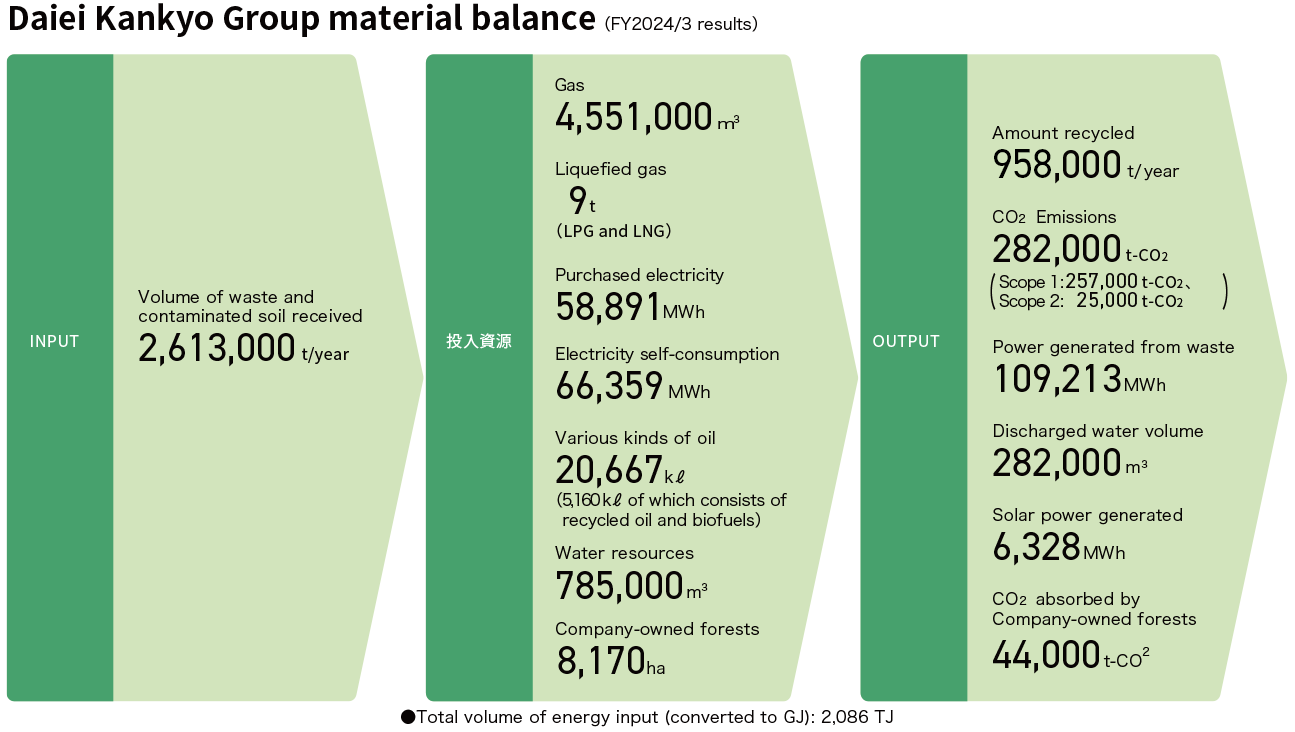

Response to Climate Change
The Daiei Kankyo Group is making efforts to manage its energy usage and greenhouse gas emissions in order to achieve carbon neutrality by 2050.
Disclosure of Financial Information on Climate Change
The Daiei Kankyo Group recognizes that responding to climate change is one of its important management issues. We are pursuing initiatives to reduce greenhouse gas emissions in society as a whole, starting from the waste management business. Specifically, we are working to advance waste management, improve the recycling rate, and generate energy through waste incineration, biogas power generation, and other means. As a company with the power to create better environments, we will continue to pursue further measures to combat climate change while also endeavoring to disclose information based on the TCFD* recommendations.
* TCFD: The Task Force on Climate-related Financial Disclosures. It was dissolved in October 2023. The International Financial Reporting Standards (IFRS) Foundation has assumed and is fulfilling that role from 2024 onward.
Information disclosure based on the TCFD recommendations
Initiatives to reduce greenhouse gas emissions
We are pursuing various initiatives to reduce CO2 emissions generated in the course of our business activities.
 Energy
Energy
conservationWe are pursuing various initiatives to reduce greenhouse gases generated in the course of our business activities.
 Recycled
Recycled
resourcesWe help to circulate resources and reduce CO2 emissions by recycling a variety of waste materials and returning them to society.
 Electricity
Electricity
generationWe recover energy from waste with high efficiency and use it for power generation and heat utilization.
 Company-owned forests
Company-owned forestsOur company-owned forests cover an area of approximately 8,170 hectares throughout Japan, and absorb approximately 44,000 tons per year.
 Solar power generation
Solar power generationWe have installed a mega solar power plant on the site of a former controlled final disposal site in Izumi City, Osaka Prefecture. We are generating renewable energy by effectively utilizing this site.
Transition in energy consumption
The Act on Rationalizing Energy Use defines energy consumption per unit as an indicator for energy management, and businesses are required to reduce their energy consumption per unit by an average of 1% or more per year over the most recent five-year period. The Daiei Kankyo Group defines energy consumption per unit using the following formula, and has achieved a cumulative reduction of 10% or more over the past five years.
- Definition of energy consumption intensity
- Energy consumption per unit (L/t)
- Crude oil equivalent energy consumption (L)/total weight of intermediate treatment (t)
(Calculated using the following conversion rates: electricity: 4 kWh = 1 L of crude oil; gas: 0.86 m3 = 1 L of crude oil; heavy oil: 1 L = 1 L of crude oil)
For the fiscal year ended March 31, 2025, energy consumption (oil equivalent) was 43,676 kL, and greenhouse gas emissions from energy consumption were 86 kt, a decrease of 6 kt compared to the previous fiscal year. This reduction is attributed to decreased fuel usage resulting from the shutdown of the gasification melting furnace in preparation for the replacement of the old furnace, as well as reduced electricity consumption due to self-generated power from the new incinerator that began operating in 2023. Under the Act on Rationalizing Energy Use, which was revised in April 2023, non-fossil energy is now subject to calculation of energy consumption. This report was therefore updated to include non-fossil energy in energy consumption.
- Groupwide energy consumption and total weight of intermediate treatment
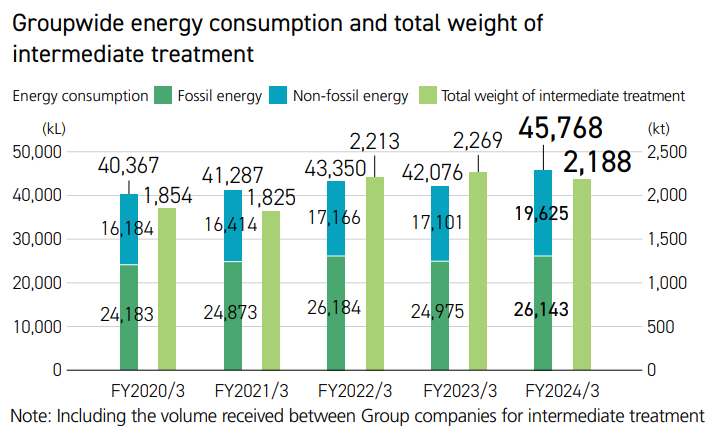
- Definition of energy consumption intensity
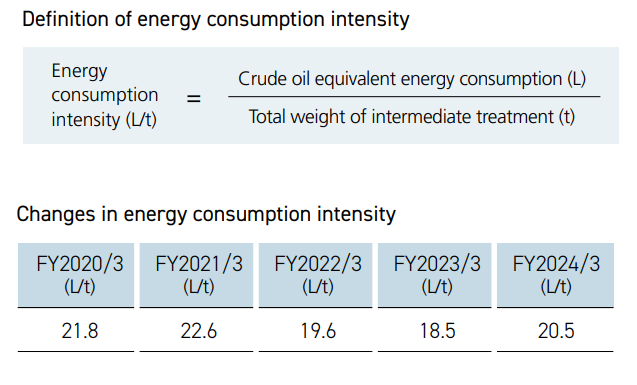
Energy Management Committee
The Energy Management Committee, which manages energy for the entire Group, reports on the actual energy consumption of each department, identifies energy issues, examines countermeasures, and horizontally deploys successful energy conservation case studies.
Since the committee was established in 2012, a total of 300 energy conservation case studies have been implemented by the Group, with a total energy-saving impact equivalent to an annual energy reduction of 2,974 kL, or 8 kt of greenhouse gas emission reduction per year.
Selected energy-saving case studies
| Name of facility |
Case study | Annual savings |
Annual equivalent CO2 reduction |
|---|---|---|---|
| All buildings on premises |
Conversion to LED lighting (cumulative up to FY2025/3) |
932,673 kWh | 393.6 t-CO2 |
| Intermediate treatment facility |
Installation of solar power generation equipment on the roof of the facility | 552,000 kWh | 268.6 t-CO2 |
| Intermediate treatment facility |
Installation of inverters on dust collectors on crushing line supply conveyors | 81,840 kWh | 34.3 t-CO2 |
| Water treatment facility |
Installation of inverters on blower equipment | 243,528 kWh | 102.5 t-CO2 |
| Incinerator | Equipping forced draft fan inverters | 226,498 kWh | 94.9 t-CO2 |
| Incinerator | Shortened drying time due to refractory material change and reduced Heavy oil A consumption | 7,500 L | 20.3 t-CO2 |
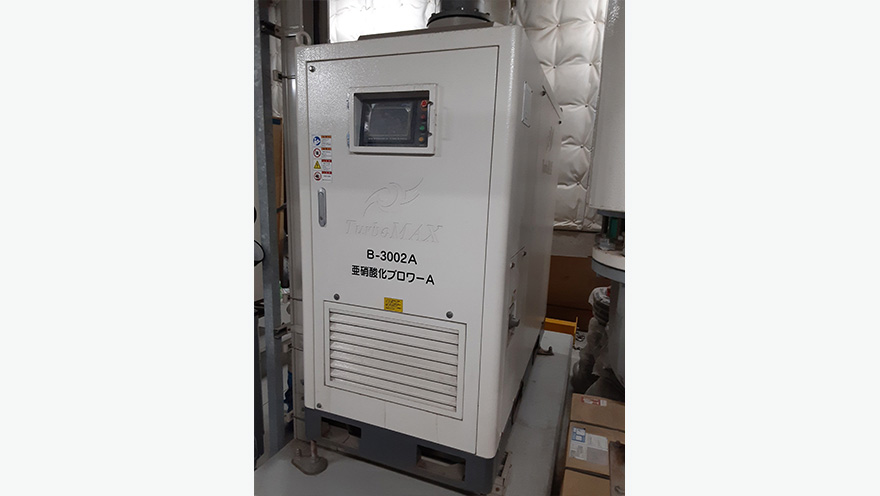
Inverters installed on blower equipment at water treatment facility at Mie Recycle Center
We installed inverters to shift the way of flow control with valve. Energy is saved by changing the output to match the flow rate.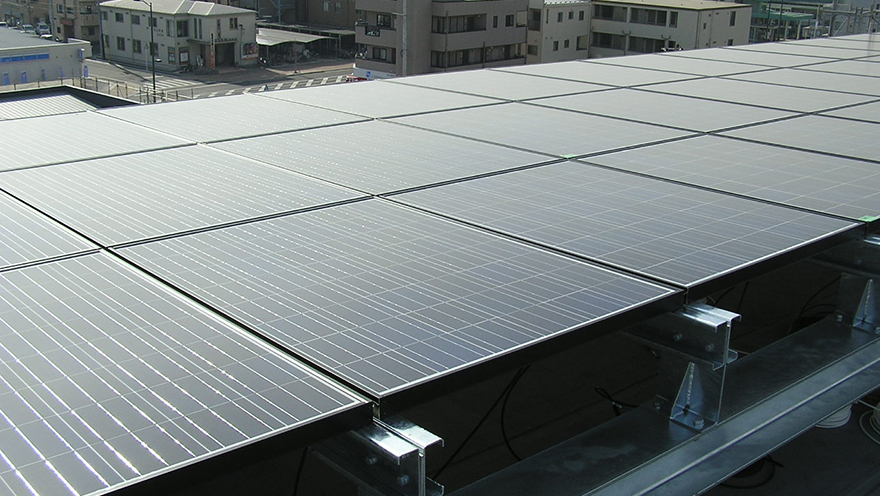
Solar power generation equipment at Kyodoh Doboku Tokyo Intermediate Treatment Site
We installed 200 kW of solar panels on the roof of the factory building, reducing electricity consumption by using what we generate in-house.
Contribution to the Reduction of Greenhouse Gas (CO2) Emissions in Society as a Whole
The Group aims to reduce greenhouse gas emissions in society as a whole by promoting initiatives to recycle waste into resources and energy. For the fiscal year ended March 31, 2025, our contributions to greenhouse gas emission reduction and absorption amounted to 189 kt.

Contribution to reduction by thermal recycling
Electricity is generated by recovering the heat generated during waste incineration. The electricity generated is used in our own facilities and surplus electricity is sold, thereby helping reduce greenhouse gas emissions at Daiei Kankyo Co., Ltd. and in the local community.
In the fiscal year ended March 31, 2025, the total amount of electricity generated was 132,978 MWh. Of this amount, 61,467 MWh was sold, equivalent to a reduction contribution of 26 kt.
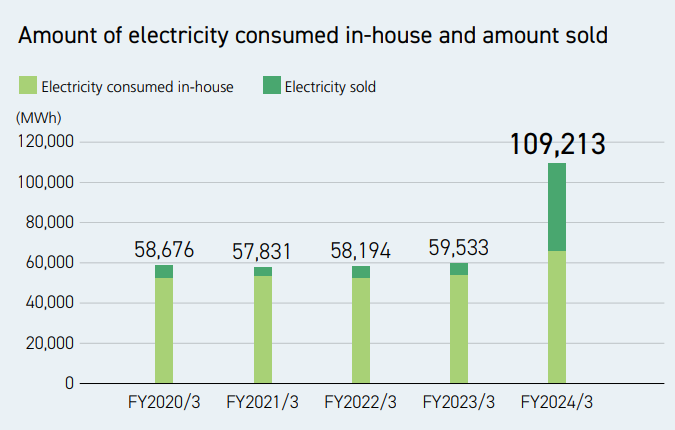
Contribution to reduction by recycling
We help reduce greenhouse gas emissions by recycling a variety of waste materials such as RPF; iron, copper, and aluminum scrap; and recycled pallets. For the fiscal year ended March 31, 2025, our outgoing volume was 48,525 tons, equivalent to a greenhouse gas emission reduction contribution of 117 kt.
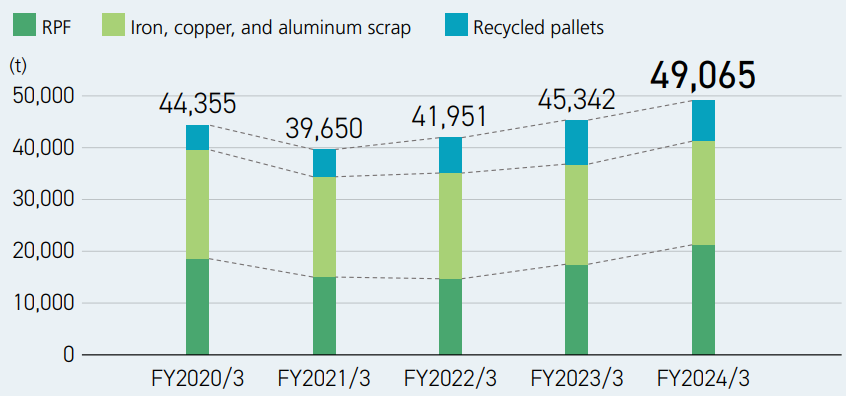
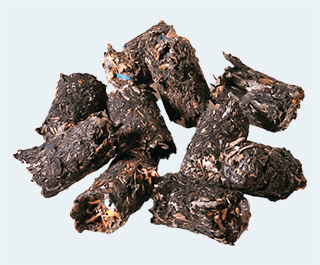
RPF (Solid fuel) CO2 reduction:
1.88 t-CO2 per ton of RPF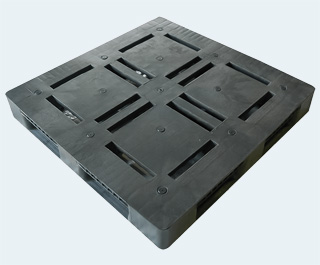
Recycled pallets CO2 reduction:
1.79 t-CO2 per ton of pallets
Contribution to reduction by solar power generation
The total amount of electricity generated by the Group’s solar power generation facilities in the fiscal year ended March 31, 2025 was 6,194 MWh. Electricity sales utilizing the feed-in-tariff (FIT) system amounted to 5,550 MWh. This is equivalent to a greenhouse gas emission reduction contribution of 2 kt.
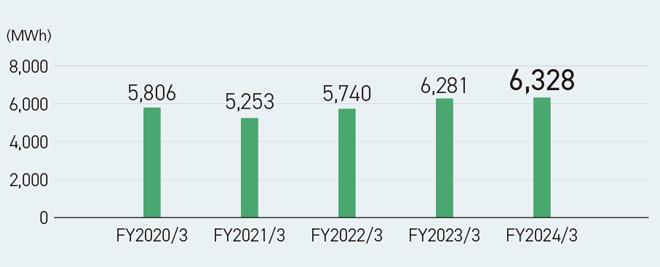
Fixation by Company-owned forests
The Group owns approximately 8,170 hectares of forest (as of June 30, 2024), and the annual amount of CO2 absorption and fixation by this vast forest is 44 kt.
Realization of a True Recycling-Oriented Society
Waste Processing and Management
The Group performs contract processing of waste generated by municipalities, various manufacturers, general contractors, medical institutions, and other businesses, and provides one-stop services from collection and transportation to intermediate treatment, recycling, and final disposal.
The Group introduced a proprietary integrated waste management system to appropriately process waste from contracted waste generators. Using the system, we strive to accurately record and provide information on waste materials, volume, processing method, and other information. Every month, we also disclose maintenance and management information according to the Waste Management and Public Cleansing Act, including results from the analysis of exhaust gases emitted from incineration and other heat treatment facilities, as well as effluent discharge from final disposal sites.
Furthermore, we have introduced an online waste management facility observation service and a waste tracking service using PCs and smartphones, thereby providing efficient, safe, and secure waste processing management according to the needs of the waste generators.
Improving Efficiency and Advancing Resource Recycling
The Daiei Kankyo Group utilizes its collective strengths to propose efficient waste management and recycling for all kinds of waste. A particularly urgent issue from the perspective of achieving carbon neutrality by 2050 is reducing, recycling, and reusing waste plastics with high CO2 emission coefficients. We are improving facilities for manufacturing recycled pellets and recycled pallets from plastic waste, and are also collaborating with partner companies on development of new plastic waste recycling technology.
Plastic bottle horizontal recycling (agreements with municipalities)
We are working to build a coordinated system with beverage manufacturers, recycled raw material manufacturers, and others to promote “bottle-to-bottle” recycling (horizontal recycling) to recycle used plastic bottles generated from municipalities back into new plastic bottles. Based on this cooperative system, we are concluding agreements on plastic bottle recycling with municipalities and pursuing horizontal recycling of plastic bottles.
Cooperating municipalities
(1) Ikeda City, (2) Ashiya City, (3) Hokutan Administrative Affairs Association, (4) Kashiwara City, Habikino City, and Fujiidera City, (5) five municipalities in Osaka, (6) Nara City, (7) Higashiosaka City, Daito City, and the Higashiosaka Cleaning Facilities Association, (8) Sumoto City, (9) Miki City, Hyogo, (10) Aioi City, Hyogo, and (11) Shinonsen Town, Hyogo
iCEP PLASTICS
It has been one year since we launched iCEP PLASTICS, a comprehensive recycling coordination service offering one-stop support from the collection of waste plastics to the supply of recycled products through molding and processing. This service is a collaborative effort by Daiei Kankyo Co., Ltd., Resource Circulation Systems Co., Ltd., Yagikuma Co., Ltd., and UNIADEX, Ltd., working together to plan and implement a recycling scheme for waste plastics and promote a circular economy through “artery–vein” collaboration. Over the past year, we have accumulated numerous achievements, especially in the construction industry, and in March 2025, we launched the “XtoCar” project, which aims to recycle waste plastics into automotive parts.
In iCEP PLASTICS, we will continue to promote artery-vein collaboration among various companies and organizations and pursue initiatives to realize a circular society that utilizes waste plastics as a resource.
-
Case example (1):
Daiwa House Industry Co., Ltd.Survey on recycling waste plastic generated from non-residential construction sites
- Investigation of waste plastics generated from non-residential construction sites in collaboration with Daiwa House Industry
- Promoting the establishment of resource recycling systems at construction sites
Examples of products that can be made by using recycled plastics 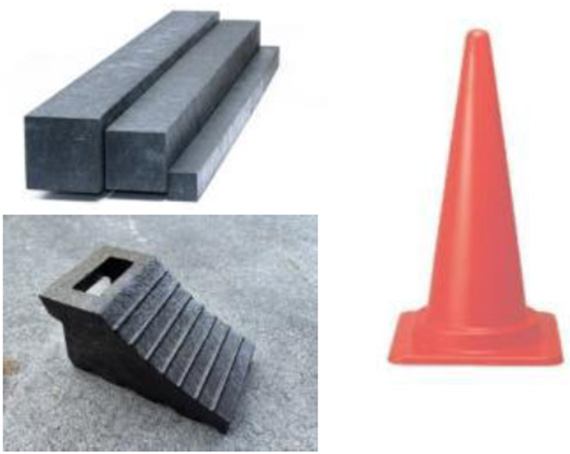
-
Case example (2):
Kajima CorporationRecycling waste plastic collected from construction sites into barricades
- Waste plastic collected from construction sites is used to produce recycled barricades Introduced at Kajima
- Corporation’s construction sited to achieve on-site resource recycling
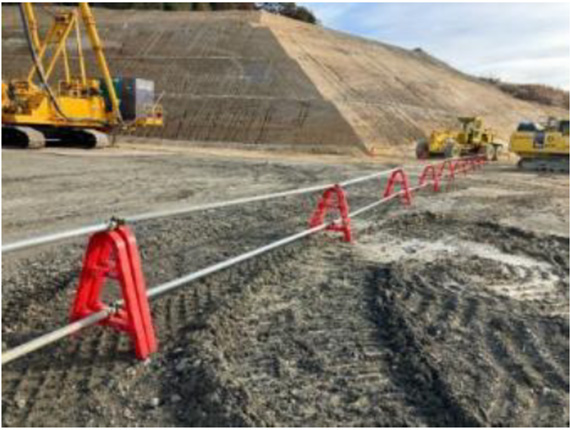
-
Case example (3):
LIXIL CorporationSupplying waste plastic as raw material for paving materials
- Supplying waste plastic as raw material for recycled paving materials
- Contributing to the realization of plastic resource recycling


Services provided by iCEP PLASTICS
- ・Support in setting material recycling targets
- ・Planning and implementation of a waste plastic recycling scheme
- ・Identification of issues and proposal of countermeasures for waste plastic material recycling
- ・Securing a waste plastic supply and transportation network
- ・Verification of the characteristics of recycled resins according to the waste plastic
- ・Development of uses for recycled plastic, using the proprietary forming technology and network
- ・Introduction of digital tools to implement recycling projects
- ・Consulting to quantify the benefits of initiatives through life cycle assessment (LCA) calculation
Diverse Actions for Plastic Recycling
In April 2023, our subsidiaries Mie Chuo Kaihatsu Co., Ltd. and DINS Kansai Co., Ltd. became the first companies in Japan to acquire certification for Plastic Recycling Plan under Japan’s Plastic Resource Circulation Act. Our system for material recycling of waste plastics, which is certified by Japan’s Ministry of Economy, Trade and Industry and Ministry of the Environment, has begun to receive interest from many waste-generating companies. In addition, with the cooperation of municipalities, we are working with partner companies to develop chemical recycling technologies, which are considered highly business-friendly, through subsidies from the Ministry of the Environment. Furthermore, we are participating in a NEDO* demonstration project, the Development of Innovative Plastic Resource Recycling Process Technology, and are conducting joint research with several research institutes and both “artery” (manufacturing) and “vein” (waste management) companies.
To realize a decarbonized society through more advanced and efficient recycling, the Daiei Kankyo Group is taking on the challenge of optimizing the combination of material recycling, chemical recycling, and thermal recycling according to the properties of waste plastics, in cooperation with various partner companies.
* NEDO: New Energy and Industrial Technology Development Organization
What is the Plastic Resource Circulation Act ?
It is a law that took effect in April 2022. Focusing on just one material, plastic, it aims to promote resource recycling throughout the entire life cycle of plastic products, including design, sales, and disposal.
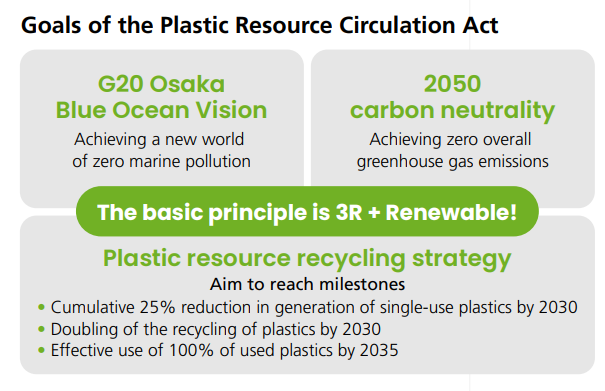
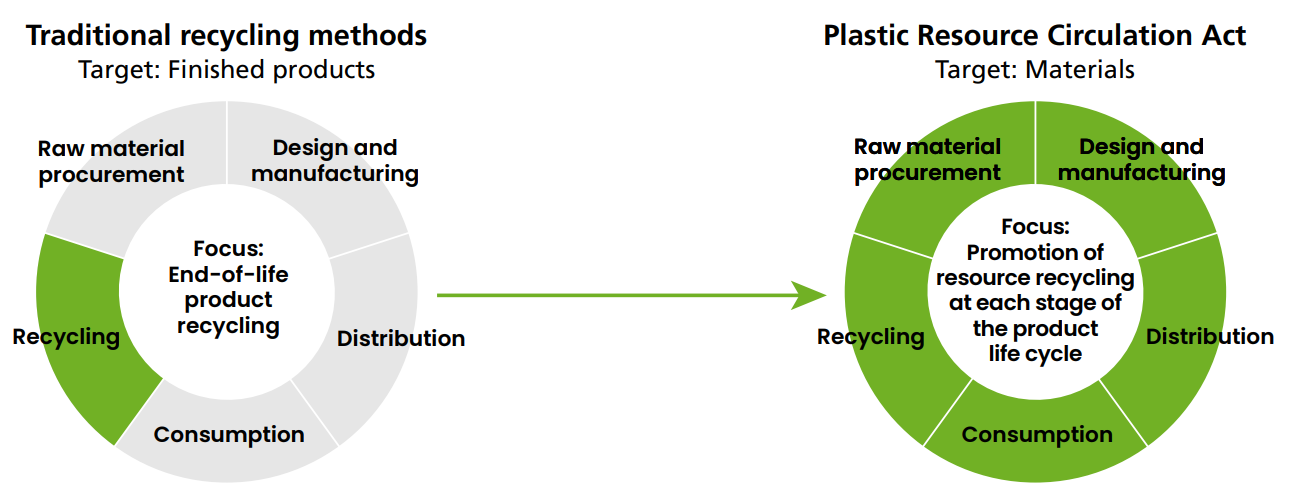
Daiei Kankyo Group Recycling: No Plastic Wasted
Conservation and Effective Use of Water Resources
Policy
We recognize that water resources are an important environmental issue. We contribute to conserve healthy water resources in local communities through efforts such as reducing water usage, minimizing environmental impact, promoting efficient utilization, and preserving forests.
Response to water risks
The business locations of the Daiei Kankyo Group are situated throughout Japan. No business location is situated in an area that poses a high risk to water, according to the evaluation of water risk using Aqueduct.*
* Aqueduct: An internet-based data platform provided by the non-profit World Resources Institute (WRI) that consolidates all information related to water risks.
Water resource intake, discharge, effective use, and wastewater impact management
At each facility of the Group, rainwater within the site is collected and utilized.
In addition, since waste incineration facilities use large amounts of water for cooling, major incineration facilities have implemented a closed system for plant water, treating and reusing it as cooling water without discharging it.
Leachate from final disposal sites is treated at water treatment facilities and properly managed according to established discharge standards.
For water quality impact management, discharged water is regularly monitored and tested according to established schedules. Going forward, we will also calculate and monitor the pollution load from each of our facilities.
Water quality load data
| FY2024/3 | FY2025/3 | |
|---|---|---|
| BOD | 0.9 t | 1.9 t |
| COD | 1.3 t | 1.2 t |
| SS | 1.1 t | 3.2 t |
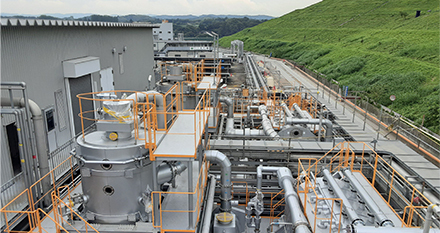
Conservation of water resources
We manage the Company-owned forests, including the forest in Mimata Town, Miyazaki, which is nationally certified as a Natural Symbiosis Site. We also preserve the water resource restoration function through the Odai Project to plant a variety of native saplings in landslide-prone areas and cultivate diverse forests.
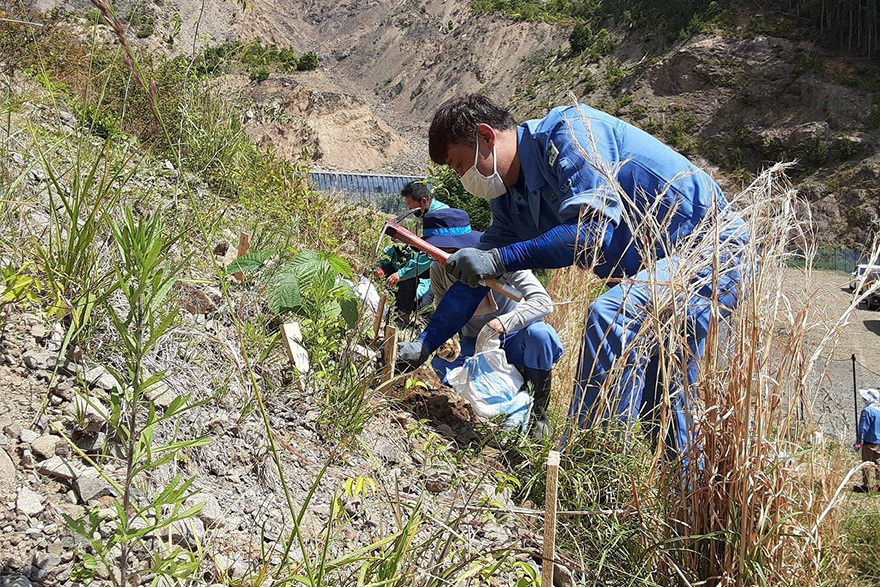
Planting on landslide-affected areas 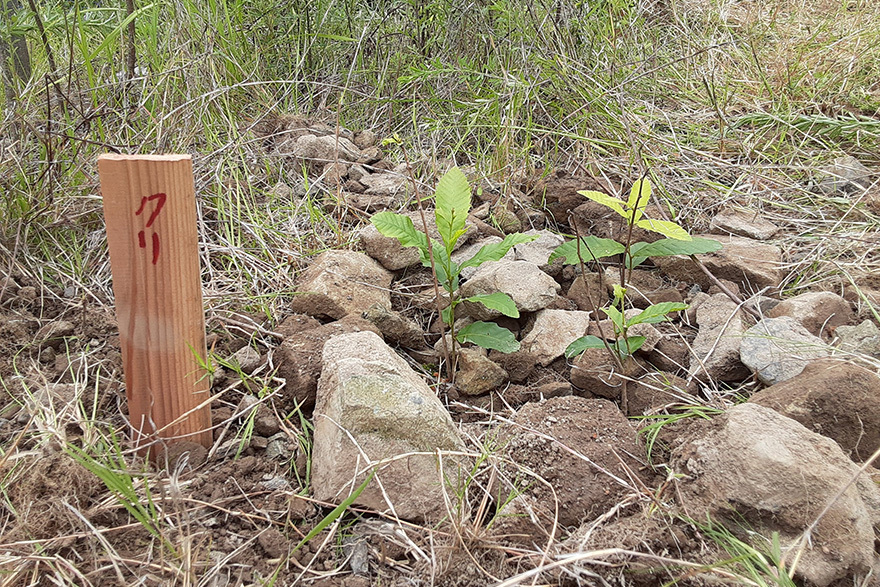
Planting chestnut seedlings
Conservation of Biodiversity
The Daiei Kankyo Group is fully aware that its business activities may have an impact on ecosystems, and is working to conserve biodiversity, which is one of the key issues for the building of Local Circular Ecological Spheres.
Participation in the 30by30 Alliance for Biodiversity
In October 2023, we joined the 30by30 Alliance for Biodiversity, a joint alliance consisting of the national government, the Ministry of the Environment, NPOs, companies, and other bodies, formed with the aim of achieving the 30by30 target of preserving or protecting 30% of land and sea areas by 2030. We will contribute to the achievement of the 30by30 target through the expansion of OECM* as Nature Symbiosis Sites, and information sharing with other alliance members.
*OECM (Other Effective area-based Conservation Measures)
Areas that contribute to the conservation of biodiversity other than nature reserves, such as company-owned forests and border zones between mountain foothills and arable flat land.
30by30 Alliance for Biodiversity (Ministry of the Environment website) (JP)
Certified as a Natural Symbiosis Site (site name: Daiei Kankyo Miyazaki Mimata Forest)
On October 6, 2023, General Agriculture & Forestry Co., Ltd., a consolidated subsidiary, acquired certification of a specified area in a Company-owned forest located in Mimata Town, Miyazaki as a Natural Symbiosis Site by the Ministry of the Environment, which certifies sites that meet the criteria for conservation value and management plans. This program covers locations where conservation of biodiversity is promoted through the initiatives of private sectors and organizations.
This certification enabled us to give form to the idea that directing awareness to the broader ecosystem, rather than only rare species, will lead to sustainable communities. Going forward we will continue to cooperate with local communities and experts, monitor and manage the certified site, and take steps to conserve biodiversity thereby contributing to Nature Positive by 2030.*
* Nature Positive by 2030: An initiative to stop the loss of biodiversity and put it on a recovery trajectory
Monitoring survey
A monitoring survey is performed regularly in the certified site, timed to coincide with blooming each season. A local expert also accompanies us as we identify plants discovered and record location and other information.
The information on plants discovered during surveys is also linked to Forest GIS and is used as one part of the materials for making decisions on considering forest areas to thin and the thinning method in the forest in Mimata Town, Miyazaki owned by Daiei Kankyo, which has long been forestry land.
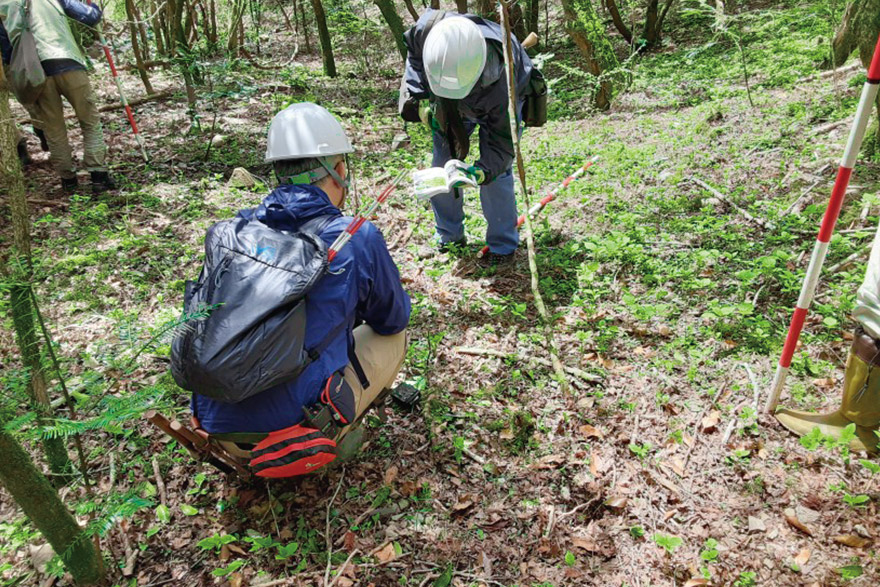
Surveying
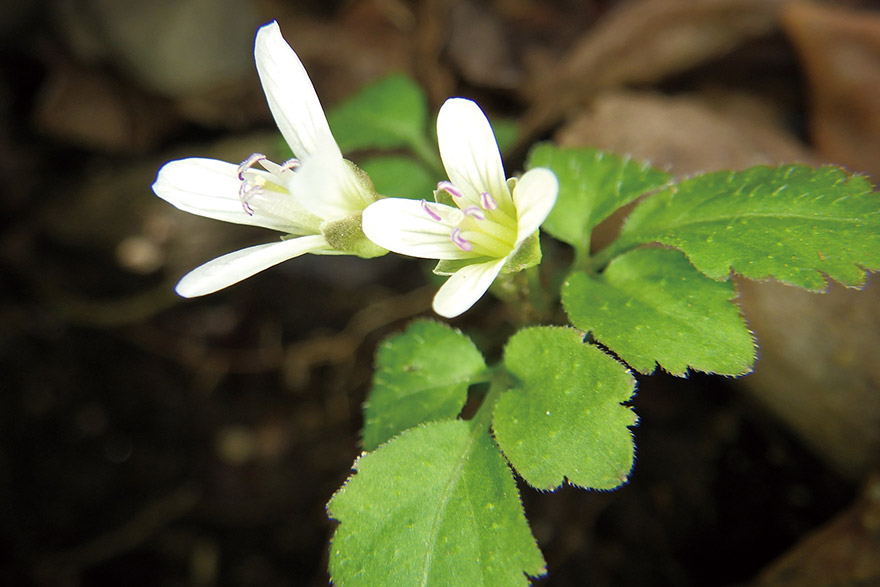
A rare species in bloom
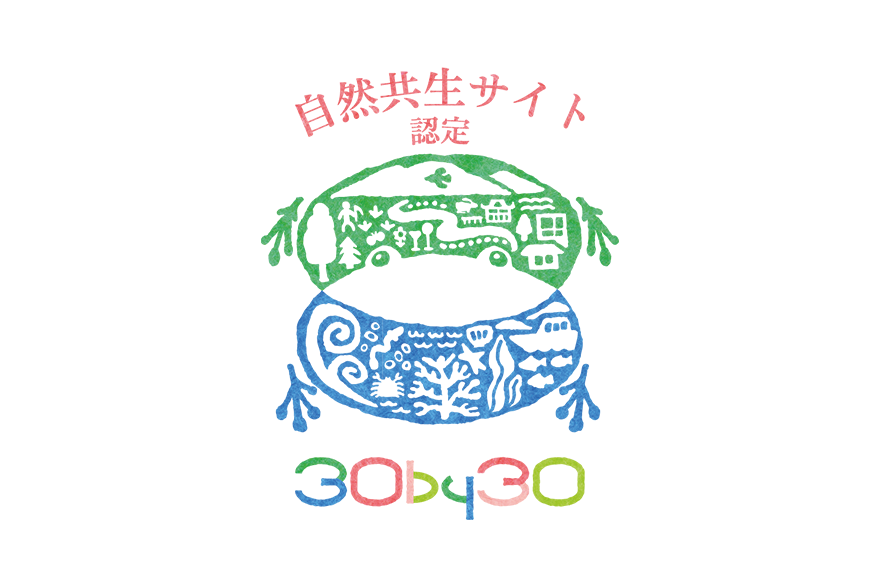
30by30 Alliance for Biodiversity Logo
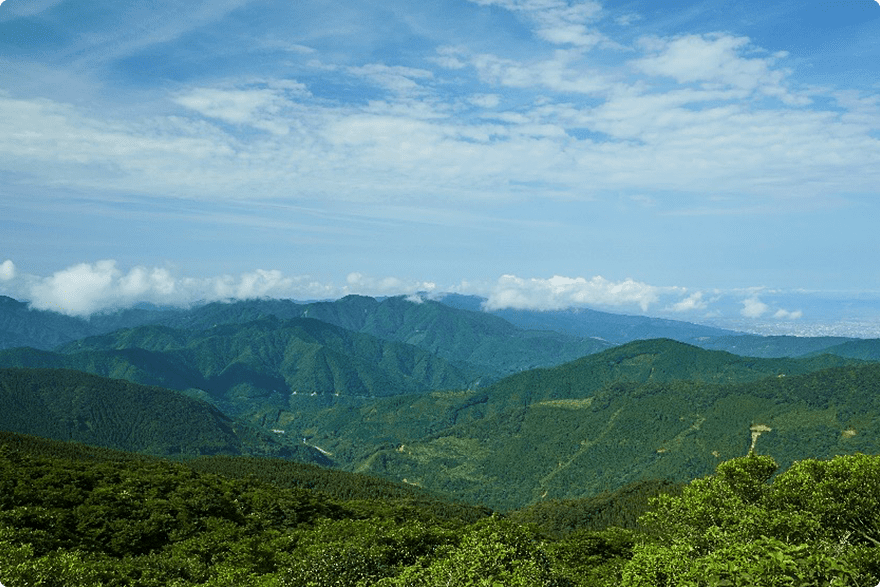
Daiei Kankyo Miyazaki Mimata Forest
Natural Symbiosis Sites (Ministry of the Environment website) (JP)
Chemical Management
We are pursuing proper management of chemicals in the chemical products we use in our business. Health hazard mitigation measures to protect the health of personnel who work with and are exposed to chemicals are implementedthroughout the Company, including performing chemical risk assessments. We also calculate chemical movement and the volume of chemicals discharged into the external environment for each site involved in our business activities, and report the data to government authorities under the Pollutant Release and Transfer Register (PRTR) system established by law.
Examples of Initiatives at Business Locations
Measures against air and water pollution
To prevent air pollution from exhaust gas generated from incineration facilities, exhaust gas is treated in a purification system to meet legal standards. Water pollution from leachate generated from final disposal sites is similarly treated, and we have established a dedicated purification facility to prevent water pollution.
The water treatment facilities at the final disposal sites of the Mie Recycle Center (Mie Chuo Kaihatsu Co., Ltd.) and the Izumi Recycle Center (Daiei Kankyo Co., Ltd.) are further reducing their environmental impact by introducing reverse osmosis (RO) membrane treatment equipment. RO membranes have the special property of allowing water to pass through but not salt, and can separate fresh water from salt by applying pressure. As a result, we have been able to discharge the water with less burden on local waters and use it as plant water effectively.
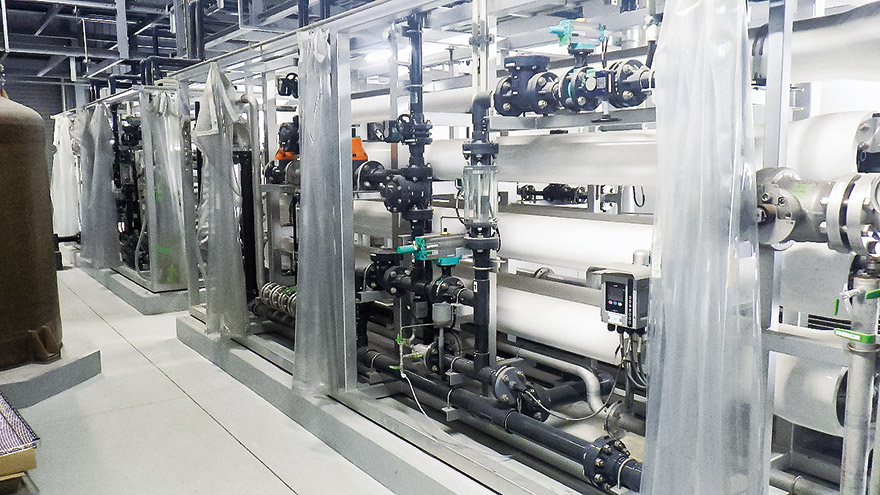
Measures against odor and dust
To prevent the spread of odors and dust in the waste management process, we have introduced deodorization and dust collection equipment. We conduct the early detection and correction of abnormalities for proper maintenance by inspecting and managing them in the course of our daily work.
Appropriate deodorization equipment is selected according to the characteristics of the waste handled. Rock wool deodorization equipment is installed at the composting facilities of the Miki Recycle Center and the Iga Recycle Center of Daiei Kankyo Co., Ltd.
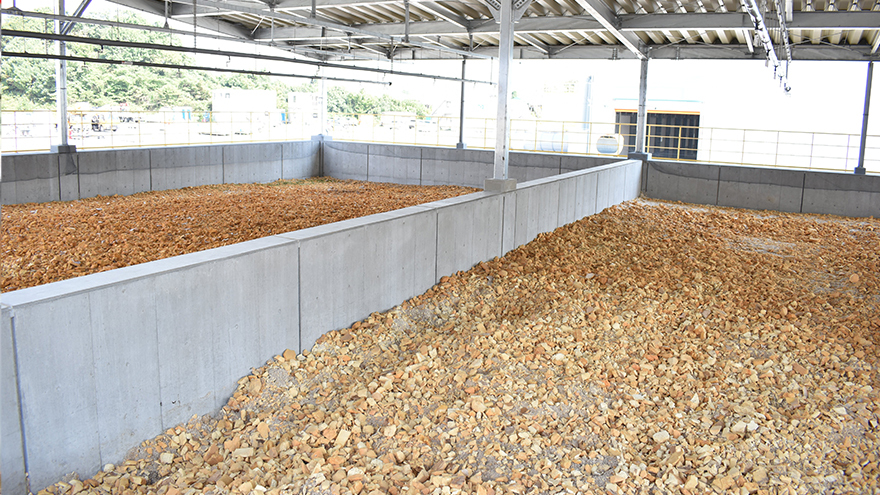
Environmental Pollution and Accident Prevention Drills
In recent years, there have been frequent fires caused by the ignition of lithium-ion batteries mixed with waste in waste management facilities. If it is not possible to extinguish the fire early, the function of the facility will stop, and the social infrastructure of waste management will be disrupted. We are installing spark detection systems, fire sprinkler systems, and other mitigation equipment Companywide, near crushing machines, which pose a particularly high risk of fire. Additionally, we consistently conduct fire drills to be prepared for emergencies.
Environmental Management
To realize the environmental philosophy we profess as a corporate group that deals with the environment, we outline a basic policy on the environment for the entire Company, each recycling facility formulates an environmental policy, and we pursue initiatives based on our environmental management organizational structure.
We also formulate an environmental conduct code and work to make sure that each employee is aware of and understands the conduct expected of them to prepare them for their work.
Environmental Management Structure
Daiei Kankyo Co., Ltd. obtained ISO 14001 certification in 1998 for the first time. Since then, each of the Group’s business sites has successively acquired ISO 14001, Eco-Action, KES Environmental Management System Standard, and other certifications as part of their efforts to efficiently reduce environmental impact and greenhouse gas emissions through steady environmental management activities.
Certification coverage rate across the Group: 78.76%
(calculated as the ratio of the number of employees at certified sites to the total number of employees [combined ISO, EA21, and KES]) *As of March 31, 2025
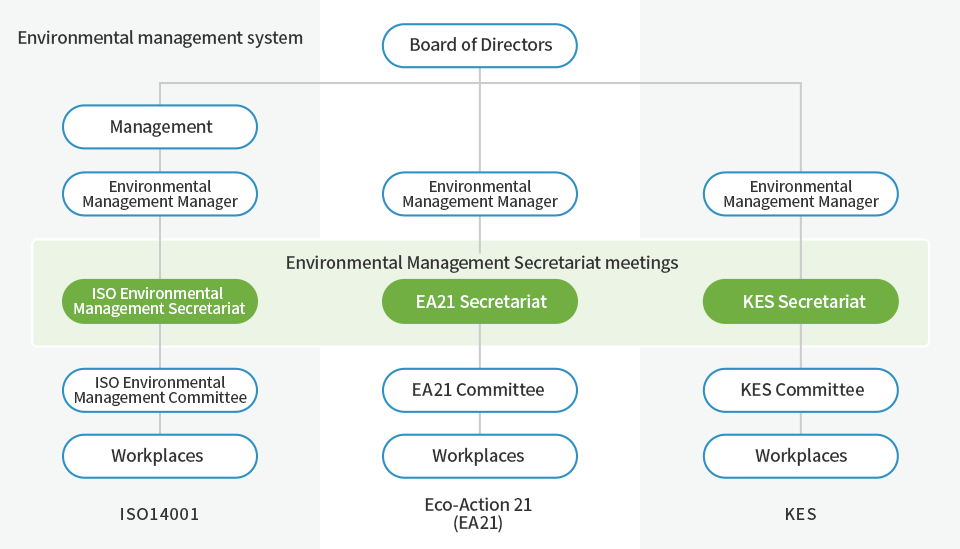
Initiatives in FY2025/3
| Initiatives in material issues |
Hold discussions aimed at linking the material issues (materiality) formulated in September 2024 with the Environmental Management System. |
|---|---|
| Carbon neutrality/ Biodiversity/ Water resource management |
Undertook initiatives for the three key environmental themes at each of our sites. |
| Expanding participation in various initiatives |
Realized streamlined management of environmental laws and regulations through interdepartmental collaboration, and also eliminated duplicate management in other operations and initiatives, contributing to overall standard improvement. |
Initiatives in FY2026/3
| Decarbonization | Advance efforts to streamline the calculation of Companywide Scope 1 to 3 emissions and improve their visibility. |
|---|---|
| Biodiversity | Continue existing biodiversity initiatives and conduct a survey of activities across the Group to compile the findings |
| Water resource management | Survey initiatives within the Group on water resource conservation and management, and compile the findings. |
Environmental Audits
In 1998, Daiei Kankyo Co., Ltd. and Mie Chuo Kaihatsu Co., Ltd. obtained ISO 14001 certification, and the Daiei Kankyo Group has since continued to expand the scope of external certification to Group companies. We are extending consistent environmental management even to new locations added through M&A in recent years, through the cross-organizational roll-out of initiatives that are characteristic of the Group.
Internal and external environmental audits conducted in FY2025/3
| Number of Daiei Kankyo Group business sites | 55* |
|---|---|
| Number of sites that have obtained ISO 14001 or Eco-Action 21 certification | 33 |
| Number of sites that conduct internal environment audits | 26 |
| Number of sites that undergo external environmental audits | 33 |
| Number of nonconformities found in internal environmental audits | 55 |
| Number of nonconformities found in external environmental audits | 0 |
* 55: 30 recycling facilities and 25 other business locations in the table of waste management and recycling business locations, in the overview of the Daiei Kankyo Group
Sustainable rallies
We conduct Groupwide “Sustainable rallies” in which participants earn points for various actions toward a sustainable society in the form of a rally. These rallies are designed to be easy for anyone including those from partner companies to participate in, such as purchasing discounted products close to the expiration date and conserving water.
Our Group has been continuing these initiatives for over the decade. The predecessor to the sustainable rally, the environmental rally, received the Executive Committee Special Award and the Environmental and Social Innovation Award at the 8th Good Life Award, hosted by the Ministry of the Environment. We will continue to promote human resource development through the sustainable rally.
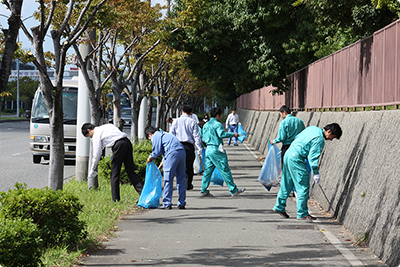
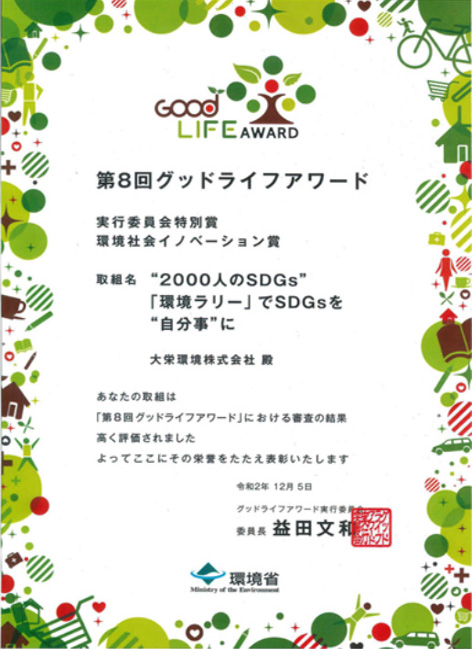
Environmental education
On request, our group provides education on the environment, recycling, SDGs initiatives, and other topics at elementary and junior high schools, high schools, universities, and various other organizations.


